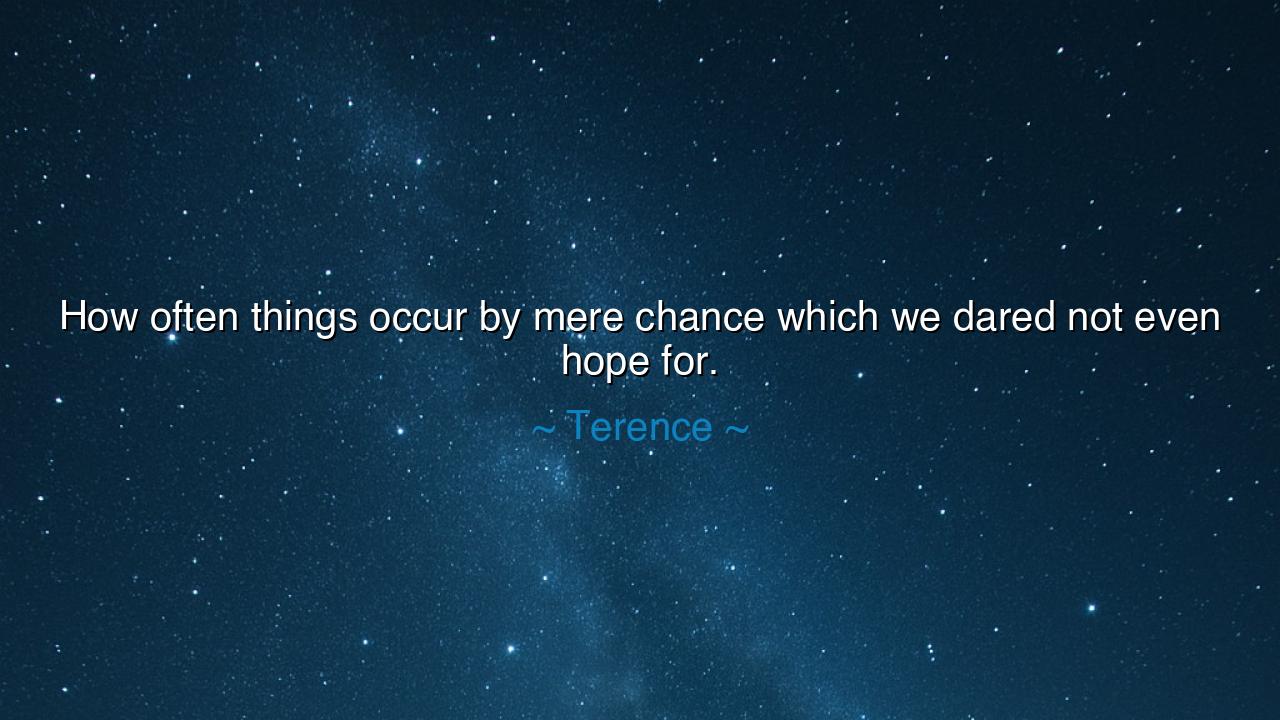
How often things occur by mere chance which we dared not even






In the grand narrative of life, where human aspirations and struggles unfold in the face of fate, there exists a profound truth often veiled in the winds of chance. Terence, the ancient Roman playwright, speaks to this truth with deep insight: “How often things occur by mere chance which we dared not even hope for.” These words reflect the very nature of existence—the fact that life, with all its uncertainties, can sometimes bless us with gifts and opportunities we never dared to dream of, gifts that arrive not through our efforts but by the mysterious hands of fate. In the ancient world, the concept of chance was often intertwined with divine will, where the gods played a role in guiding human destinies, revealing that life’s most significant moments might come not from our striving, but from the capricious forces of luck.
The ancients were keenly aware of this power. The Greeks, for instance, saw fate as a divine force, sometimes as cruel as it was generous. Heraclitus, the great philosopher, spoke of the flux of life, where chaos and order were constantly at play. In his view, life was a balance of opposites, where the unknown often revealed itself in moments of chance. Similarly, Terence’s reflection is not one of resignation, but of acknowledgment—a reminder that in the pursuit of our goals, the unexpected can emerge and shape the course of our lives in ways we could never have predicted. Chance is not merely random; it is a part of the tapestry of life that, when embraced, offers possibilities beyond our imagining.
Consider the story of Odysseus, the hero of Homer’s epic, The Odyssey. His journey was one marked by both tragedy and fortune, where countless obstacles seemed insurmountable. Yet, it was often by chance that he survived—whether through the unexpected help of the gods or through a twist of fate that changed his course. Odysseus did not know the paths that lay ahead, nor could he have hoped for the blessings he would receive, yet those moments of chance—his encounters with divine beings, his miraculous escapes—shaped his journey. Much like Terence’s words, the story of Odysseus teaches us that life’s greatest victories often come through the intervention of chance, not from our own planning or control.
In the ancient Roman Empire, the story of Cincinnatus, the humble farmer who was called upon to serve as dictator and lead Rome to victory, also echoes the power of chance. Cincinnatus was living a simple life when news came that Rome was in peril, and the Republic needed a leader. With little preparation and no ambition for power, he answered the call and saved the city. Afterward, he returned to his fields, a humble man once more. His rise and fall from power were not the result of personal ambition or careful planning, but rather the chance to serve when his country needed him. His story is a powerful reminder that, sometimes, life offers opportunities we never thought possible—if we are willing to embrace them when they come.
Similarly, in the modern world, chance often shapes the paths of individuals in ways that defy all expectations. Consider the discovery of penicillin by Alexander Fleming in 1928. A seemingly small and random incident—Fleming noticed a mold that had formed on a petri dish—led to one of the greatest medical breakthroughs in human history. Fleming’s initial discovery was not part of a planned experiment, but a fortunate accident. In this moment, we see that what was not even hoped for—the possibility of fighting bacterial infections—became a reality, thanks to the hand of chance. Terence’s quote reminds us that fortune often comes not through our own designs, but through moments of serendipity, those moments when we are open to the unexpected.
In our own lives, the lesson of Terence is one of humility and openness. It is easy to become consumed by our own plans, to think that everything must happen according to our timing and designs. Yet, as Terence teaches us, there is a power in chance, in being open to the unexpected gifts life may present. Instead of clinging desperately to our plans, we must learn to embrace uncertainty, to trust that the unseen forces of the world will sometimes offer us opportunities we never imagined. These moments are not to be feared, but welcomed—for they may lead us to the very thing we need, whether in love, career, or personal growth.
Thus, we must remember that life is not solely within our control. There is a place for planning and effort, but there is also room for the unexpected. Terence’s words invite us to acknowledge that while we may work diligently toward our goals, the greatest joys and opportunities may arise through chance, not through the sheer force of our will. Embrace the unexpected. Look for the gifts that come through serendipity, for life’s greatest blessings may come at the moments when we least expect them, reminding us that fortune is often just waiting to be discovered.






AAdministratorAdministrator
Welcome, honored guests. Please leave a comment, we will respond soon